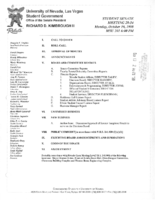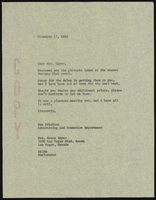Search the Special Collections and Archives Portal
Search Results

Meeting minutes for Consolidated Student Senate University of Nevada, Las Vegas, October 19, 1998
Date
Archival Collection
Description
Text

Transcript of interview with Rosemary A. Vassiliadis by Stefani Evans and Claytee White, April 12, 2017
Date
Archival Collection
Description
“My very first car… Oh, boy, I can't remember the year. It was old. But it was a [Chevrolet] Monte Carlo. Oh, my gosh, I was so excited. . . . It was my pride and joy. I'm a teenager, right? It was freedom. That's what it was.” It might seem incongruous that the aviation director for the nation’s eighth busiest airport ranked by passenger volume would begin an oral history rhapsodizing over the freedom her first car represented. But despite the powerful role she occupies professionally, Rosemary Vassiliadis remains true to her Chicago upbringing in a tight-knit Italian family, in which she was the first female on both sides to go to a four-year college. Rosemary attended nearby DePaul University, where she earned her degree in accountancy. Shortly before she graduated she was a bridesmaid for an Italian friend whose Greek Orthodox groom had asked Billy Vassiliadis to be his groomsman. Over the three days of the wedding Rosemary and Billy became acquainted and began a long-distance courtship that continued for nearly nine years before Rosemary finally agreed to marry Billy and make Las Vegas her home. This oral history chronicles Rosemary Vassiliadis’s Las Vegas career from financial analyst with the City of Las Vegas under Myron Leavitt to working with Randy Walker at Clark County to working with him again as deputy director of aviation at McCarran Airport; she shares how both men mentored her, and how their teaching has in turn inspired her to mentor younger women leaders. She talks about managing the airport in the six days after the Nine-Eleven (9/11) Terrorist Attacks, during which time Walker, who had been attending a conference in Montreal, was grounded there when all North American airports closed; she talks about working cooperatively with the Las Vegas Convention and Visitors Authority to transport tourists once the other airports opened, and she confides her determination to get her New York passengers home first so they could learn the fates of, comfort, and draw comfort from their loved ones. She walks listeners through the process of planning for Terminal 3, including financing it during the downturn, selecting its art, and seizing the opportunity to thank President Obama in person for making Terminal 3 possible-a “thank you” that resulted in an autographed photograph of the aviation director with the President as they stood on the tarmac in front of said terminal. While Rosemary’s ideas of freedom and transportation have likely matured since she bought her first gas guzzler in Chicago, she has acquired a firm grasp on what it takes to run the eighth-largest passenger airport in the U.S., which in 2017 serves the second-most popular U.S. travel destination (after New York City, according to TripAdvisor). Las Vegas is lucky that Rosemary agreed to serve as her friend’s bridesmaid and to eventually say “yes” to the persistent (and patient) Billy Vassiliadis. In 2017, Clark County School District recognized the couple’s many contributions by establishing the Billy & Rosemary Vassiliadis Elementary School.
Text
Asalee Harris oral history interview
Identifier
Abstract
Oral history interview with Asalee Harris conducted by Claytee D. White on May 17, 2021 for African Americans in Las Vegas: a Collaborative Oral History Project. Asalee Harris was born in Fortune Fork, outside of Tallulah, Louisiana. Born into a family of cotton sharecroppers, farm life was arduous; eventually she and her family moved to Tallulah where she met and married her husband, James. Asalee and James moved to Las Vegas in 1954 where James' brother lived. She details her work as a maid and member of the Culinary Workers Union Local 226, local businesses she remembers on Jackson Street including Wesley's Barber Shop, Johnson's Grocery Store, Elite Market, the Westside Credit Union, and her church work at New Jerusalem Church. Subjects discussed include: sharecropping, Tallulah, Louisiana, Westside Credit Union, and New Jerusalem Church.
Archival Collection

Meeting minutes for Consolidated Student Senate University of Nevada, Las Vegas, October 27, 1994
Date
Archival Collection
Description
Text
Tia Stone oral history interview
Identifier
Abstract
Oral history interview with Tia Stone conducted by Claytee D. White on September 25, 2020 for African Americans in Las Vegas: a Collaborative Oral History Project.
Tia Stone was the organizer of several Las Vegas protests, including marches for justice after the murder of George Floyd and for the Black Lives Matter movement. She discusses how she planned these rallies, the makeup of the attendees, and her thoughts on what local and national police reform should look like.
Archival Collection

Karate lessons for female the Sands Hotel employees: photographs and press releases
Date
Archival Collection
Description
Series X. Employees
Sands Hotel and Casino
Mixed Content
Porter, Carrie Townley
Carrie Townley Porter was born July 07, 1935 in Central Texas near present-day Fort Hood. Townley finished high school in Austin, Texas and attended the University of Texas in Austin for two years. She left college to get married, and she and her geologist husband lived in Kansas, Oklahoma, and Albuquerque, New Mexico. They had three children with no reliable child care so Townley became a housewife for a period. The Townleys lived a full and active life in Las Vegas, Nevada and Carrie Townley eventually got hired as a substitute teacher.
Person
Bailey, Anna (Anna E.) (1921-2005)
Anna Bailey was born May 14, 1921 in Savannah, Georgia. Bailey arrived in Las Vegas in 1955 to perform as a dancer for the opening of the Moulin Rouge Hotel and Casino. Six months later the Rouge closed, leaving both Anna and her husband, Bob, without work, since Bob had been the house singer and emcee at the Hotel. Nevertheless, Anna and Bob decided to make Las Vegas their home, convinced in the growth potential of the city.
Person
Rojas, Joseph A., 1933-2009
Dr. Joseph Rojas, born December 09, 1933 in Alexandria, Louisiana, was the son of Joseph Edward and Carroll Rojas. He graduated high school at age 16 and entered Loyola University of the South. Two years later, he was accepted at Louisiana State University School of Medicine, graduating with a medical degree in 1957. He interned at Charity Hospital and then completed his Obstetrics- Gynecology (OB-GYN) residency at Tulane University.
Person

